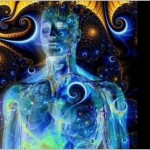Thoughts, feelings, attitudes and beliefs (conscious or unconscious) create forms, like obstacles and grooves, in our subtle bodies. These forms direct the flow of our emotional energy, thus influencing the way we feel and eventually behave. 
The stronger the feeling or belief, the more intense is the form created and its corresponding influence. Forms derived from truth are permanent. Those derived from illusions can and should be dissipated. They will only last for the duration of their corresponding feeling or belief, whether we are aware of them or not. The more unconscious a feeling or belief is, the more difficult it will be to dissipate the forms it creates, since one can only act upon feelings and beliefs that are exposed to the level of consciousness.
If you cannot let go of your self-will, if you cannot accept that life and people be different from what you think they should be, then you feel and believe that whatever happens contrary to your  will means danger to you. You tend to see terrible threats where none really exists. This is what creates the feeling of being in (or on the verge of) an abyss.
will means danger to you. You tend to see terrible threats where none really exists. This is what creates the feeling of being in (or on the verge of) an abyss.
This feeling does not apply to every situation, to your entire personality, or to every area of your life, but it may be sneakingly entrenched in some areas.
There is an illusory abyss within each one of us. Although it is illusory, as long as we do not realize that it is illusory, it affects us as if it were real. It is only when we realize that what we so direly  feared cannot cause us any real harm that we can see the abyss disappear.
feared cannot cause us any real harm that we can see the abyss disappear.
What others do cannot harm us, unless we resonate with their wrongdoings. Manifestations coming out of the higher, real self of a person will be positive and will positively affect others. Manifestations from lower layers of the personality will be impure, but will only affect the corresponding layers of those who resonate at that same impure level.
The immature child expects life to be exactly as it wants it, how it wants it and when it wants it. The child wants absolute freedom of choices and decisions, without the responsibility for the outcomes. This utopian way of perceiving life may subconsciously remain in adult life, numbing the commitment for self-responsibility.
When this expected freedom is not possible in everyday life, we feel threatened and insecure, like in the verge of a dreadful abyss. The abyss can only disappear if you let yourself drop into it and  realize that you did not crash or perish as you feared, but that you safely float, free of any abyss. If honestly confronting yourself, you will realize that the only suffering eventually present in this situation will be due to the frustration of your own immature and unrealistic expectations about life.
realize that you did not crash or perish as you feared, but that you safely float, free of any abyss. If honestly confronting yourself, you will realize that the only suffering eventually present in this situation will be due to the frustration of your own immature and unrealistic expectations about life.
It is important that you find in yourself the part where you desire freedom without self-responsibility. This immature desire is often hidden (unconscious) and needs to be approached in a way that varies with each individual, but always requiring a great deal of self-honesty.
 Quite often we expect full support and collaboration from our fellow human beings, whom we want to blame if things go wrong, just the way we may immaturely and subconsciously feel about God.
Quite often we expect full support and collaboration from our fellow human beings, whom we want to blame if things go wrong, just the way we may immaturely and subconsciously feel about God.
This way of seeing life is often transferred into adult life as an immature concept of God as a benign authority above us, who will direct our lives as we freely wish, and who will take responsibility for any adverse results.
To the extent we shift responsibility from our self onto others (God included) we curtail our own freedom. The same law is at work even in the animal world. A pet has no freedom, but it is not responsible for obtaining its own food and shelter. A wild animal is free, but it is responsible to look out for itself. This must apply much more to humanity.
Giving up the world of Utopia (absolute freedom without responsibility) appears as an abyss. To let go of the illusion and to assume full self-responsibility seems so hard that fear of it becomes a good part of the abyss. You seem to think that you will fall right in if you really assume self-responsibility. Therefore, you constantly strain away from it, stemming against it, and this consumes strength.
When we do not accept our inadequacies in a given area, we fear to make mistakes in that area. We therefore do not want to accept responsibility for doing anything in that area. This is an indication that we are still tied to the state of Utopia in that area. We will therefore fear the abyss there.
The only way you can discover the illusion of this fear, this abyss and its illusory nature, is first to visualize, feel, and experience its existence in you in the various manifestations and reactions of your daily life, and then to jump into it, by taking full responsibility for your own life. Otherwise it cannot dissolve.
January 2015
__________________________________________
This article is based on the Pathwork Lecture # 60. You may read that lecture in its entirety by following the link provided.

 1-416-561-5780
1-416-561-5780